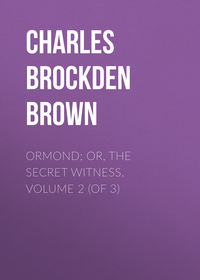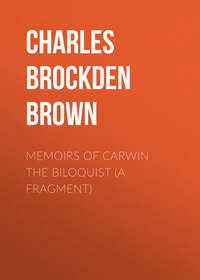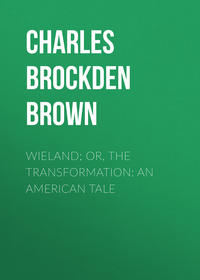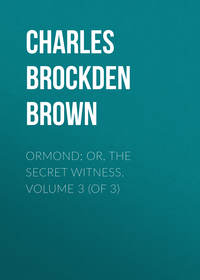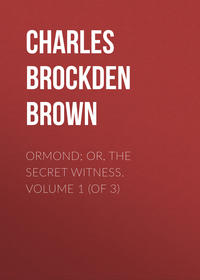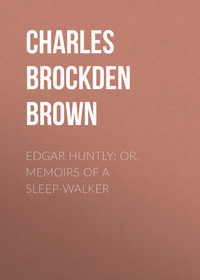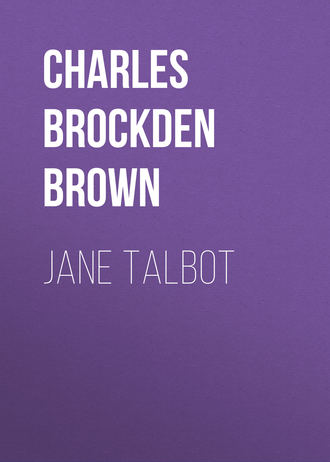 полная версия
полная версияJane Talbot
Another messenger! with a letter for me! Miss Jessup's servant it is, perhaps. But let me read it.
Letter XLVII
To Henry ColdenDecember 8.
Sir:–
Enclosed is a letter, which you may, if you think proper, deliver to Mrs. Fielder. I am very ill. Don't attempt to see me again. I cannot be seen. Let the enclosed satisfy you. It is enough. Never should I have said so much, if I thought I were long for this world.
Let me not have a useless enemy in you. I hope the fatal effects of my rashness have not gone further than Mrs. Talbot's family. Let the mischief be repaired as far as it can be; but do not injure me unnecessarily. I hope I am understood.
Let me know what use you have made of the letter you showed me, and, I beseech you, return it to me by the bearer.
M. JESSUP.
Letter XLVIII
To Mrs. FielderDecember 8.
Madam:–
This comes from a very unfortunate and culpable hand,–a hand that hardly knows how to sign its own condemnation, and which sickness, no less than irresolution, almost deprives of the power to hold the pen.
Yet I call Heaven to witness that I expected not the evil from my infatuation which, it seems, has followed it. I meant to influence none but Mr. Talbot's belief. I had the misfortune to see and to love him long before his engagement with your daughter. I overstepped the limits of my sex, and met with no return to my generous offers and my weak entreaties but sternness and contempt.
You, madam, are perhaps raised above the weakness of a heart like mine. You will not comprehend how an unrequited passion can ever give place to rage and revenge and how the merits of the object preferred to me should only embitter that revenge.
Jane Talbot never loved the man whom I would have made happy. Her ingenuous temper easily disclosed her indifference, and she married not to please herself, but to please others. Her husband's infatuation in marrying on such terms could be exceeded by nothing but his folly in refusing one who would have lived for no other end than to please him.
I observed the progress of the intimacy between Mr. Colden and her, in Talbot's absence; and can you not conceive, madam, that my heart was disposed to exult in every event that verified my own predictions and would convince Talbot of the folly of his choice? Hence I was a jealous observer. The worst construction was put upon your daughter's conduct. That open, impetuous temper of hers, confident of innocence, and fearless of ungenerous or malignant constructions, easily put her into my power. Unrequited love made me her enemy as well as that of her husband, and I even saw, in her unguarded deportment, and in the reputed licentiousness of Mr. Colden's principles, some reason, some probability, in my surmises.
Several anonymous letters were written to you. I thank Heaven that I was seldom guilty of direct falsehoods in these letters. I told you little more than what a jealous eye and a prying disposition easily discovered; and I never saw any thing in their intercourse that argued more than a temper thoughtless and indiscreet. To distinguish minutely between truths and exaggerations, in the letters which I sent you, would be a painful and, I trust, a needless task, since I now solemnly declare that, on an impartial review of all that I ever witnessed in the conduct of your daughter, I remember nothing that can justify the imputation of guilt. I believe her conduct to Colden was not always limited by a due regard to appearances; that she trusted her fame too much to her consciousness of innocence, and set too lightly by the malignity of those who would be glad to find her in fault, and the ignorance of others, who naturally judged of her by themselves. And this, I now solemnly take Heaven to witness, is the only charge that can truly be brought against her.
There is still another confession to make. If suffering and penitence can atone for any offence, surely mine has been atoned for! But it still remains that I should, as far as my power goes, repair the mischief.
It is no adequate apology, I well know, that the consequences of my crime were more extensive and durable than I expected; but is it not justice to myself to say that this confession would have been made earlier if I had earlier known the extent of the evil? I never suspected but that the belief of his wife's infidelity was buried with Talbot.
Alas! wicked and malignant as I was, I meant not to persuade the mother of her child's profligacy. Why should I have aimed at this? I had no reason to disesteem or hate you. I was always impressed with reverence for your character. In the letters sent directly to you, I aimed at nothing but to procure your interference, and make maternal authority declare itself against that intercourse which was essential to your daughter's happiness. It was not you, but her, that I wished to vex and distress.
I called at Mrs. Talbot's at a time when visitants are least expected. Nobody saw me enter. Her parlour was deserted; her writing-desk was open; an unfinished letter caught my eye. A sentiment half inquisitive and half mischievous made me snatch it up and withdraw as abruptly as I entered.
On reading this billet, it was easy to guess for whom it was designed. It was frank and affectionate; consistent with her conjugal duty, but not such as a very circumspect and wary temper would have allowed itself to write.
How shall I describe the suggestions that led me to make a most nefarious use of this paper? Circumstances most unhappily concurred to make my artifice easy and plausible. I discovered that Colden had spent most of the preceding night with your daughter. It is true a most heavy storm had raged during the evening, and the moment it remitted (which was not till three o'clock) he was seen to come out. His detention, therefore, candour would ascribe to the storm; but this letter, with such a conclusion as was too easily made, might fix a construction on it that no time could remove and innocence could never confute.
I had not resolved in what way I should employ this letter, as I had eked it out, before Mr. Talbot's return. When that event took place, my old infatuation revived. I again sought his company, and the indifference, and even contempt, with which I was treated, filled me anew with resentment. To persuade him of his wife's guilt was, I thought, an effectual way of destroying whatever remained of matrimonial happiness; and the means were fully in my power.
Here I was again favoured by accident. Fortune seemed determined to accomplish my ruin. My own ingenuity in vain attempted to fall on a safe mode of putting this letter in Talbot's way, and this had never been done if chance had not surprisingly befriended my purpose.
One evening I dropped familiarly in upon your daughter. Nobody was there but Mr. Talbot and she. She was writing at her desk as usual, for she seemed never at ease but with a pen in her fingers; and Mr. Talbot seemed thoughtful and uneasy. At my entrance the desk was hastily closed and locked. But first she took out some papers, and, mentioning her design of going up-stairs to put them away, she tripped to the door. Looking back, however, she perceived she had dropped one. This she took up, in some hurry, and withdrew.
Instead of conversing with me, Talbot walked about the room in a peevish and gloomy humour. A thought just then rushed into my mind. While Talbot had his back towards me, and was at a distance, I dropped the counterfeit, at the spot where Jane had just before dropped her paper, and with little ceremony took my leave. Jane had excused her absence to me, and promised to return within five minutes. It was not possible, I thought, that Talbot's eye, as he walked backward and forward during that interval, could miss the paper, which would not fail to appear as if dropped by his wife.
My timidity and conscious guilt hindered me from attempting to discover, by any direct means, the effects of my artifice. I was mortified extremely in finding no remarkable difference in their deportment to each other. Sometimes I feared I had betrayed myself; but no alteration ever afterwards appeared in their behaviour to me.
I know how little I deserve to be forgiven. Nothing can palliate the baseness of this action. I acknowledge it with the deepest remorse, and nothing, especially since the death of Mr. Talbot, has lessened my grief, but the hope that some unknown cause prevented the full effect of this forgery on his peace, and that the secret, carefully locked up in his own breast, expired with him. All my enmities and restless jealousy found their repose in the same grave.
You have come to the knowledge of this letter, and I now find that the fraud was attended with even more success than I wished it to have.
Let me now, though late, put an end to the illusion, and again assure you, madam, that the concluding paragraphs were written by me, and that those parts of it which truly belong to your daughter are perfectly innocent.
If it were possible for you to forgive my misconduct, and to suffer this confession to go no further than the evil has gone, you will confer as great a comfort as can now be conferred on the unhappy
M. JESSUP.
Letter XLIX
To James MontfordPhiladelphia, December 9.
I WILL imagine, my friend, that you have read the letter [Footnote: The preceding one.] which I have hastily transcribed. I will not stop to tell you my reflections upon it, but shall hasten with this letter to Mrs. Fielder. I might send it; but I have grown desperate.
A final effort must be made for my own happiness and that of Jane. From their own lips will I know my destiny. I have conversed too long at a distance with this austere lady. I will mark with my own eyes the effect of this discovery. Perhaps the moment may prove a yielding one. Finding me innocent in one respect, in which her persuasion of my guilt was most strong, may she not remit or soften her sentence on inferior faults? And what may be the influence of Jane's deportment, when she touches my hand in a last adieu?
I have complied with Miss Jessup's wish in one particular. I have sent her the letter which I got from Hannah, unopened; unread; accompanied with a few words, to this effect:–
"If you ever injured Mr. Talbot, your motives for doing so entitle you to nothing but compassion, while your present conduct lays claim, not only to forgiveness, but to gratitude. The letter you intrust to me shall be applied to no purpose but that which you proposed by writing it. Enclosed is the paper you request, the seal unbroken and its contents unread. In this, as in all cases, I have no stronger wish than to act as
"YOUR TRUE FRIEND."
And now, my friend, lay I down the pen for a few hours,–hours the most important, perhaps, in my eventful life. Surely this interview with Mrs. Fielder will decide my destiny. After it, I shall have nothing to hope.
I prepare for it with awe and trembling. The more nearly it approaches, the more my heart falters. I summon up in vain a tranquil and steadfast spirit; but perhaps a walk in the clear air will be more conducive to this end than a day's ruminations in my chamber.
I will take a walk.
And am I then–but I will not anticipate. Let me lead you to the present state of things without confusion.
With what different emotions did I use to approach this house! "It still contains," thought I, as my wavering steps brought me in sight of it, "all that I love; but I enter not unceremoniously now. I find her not on the accustomed sofa, eager to welcome my coming with smiling affability and arms outstretched. No longer is it home to me, nor she assiduous to please, familiarly tender and anxiously fond, already assuming the conjugal privilege of studying my domestic ease."
I knocked, somewhat timorously, at the door,–a ceremony which I had long been in the habit of omitting: but times are changed. I was afraid the melancholy which was fast overshadowing me would still more unfit me for what was coming; but, instead of dispelling it, this very apprehension deepened my gloom.
Molly came to the door. She silently led me into a parlour. The poor girl was in tears. My questions as to the cause of her distress drew from her a very indistinct and sobbing confession that Mrs. Fielder had been made uneasy by Molly's going out so early in the morning; had taken her daughter to task; and, by employing entreaties and remonstrances in turn, had drawn from her the contents of her letter to me and of my answer.
A strange, affecting scene had followed: indignation and grief on the mother's part; obstinacy, irresolution, sorrowful, reluctant penitence and acquiescence on the side of the daughter; a determination, tacitly concurred in by Jane, of leaving the city immediately. Orders were already issued for that purpose.
"Is Mrs. Fielder at home?"
"Yes."
"Tell her a gentleman would see her."
"She will ask, perhaps–Shall I tell her who?"
"No–Yes. Tell her I wish to see her."
The poor girl looked very mournfully:–"She has seen your answer which talks of your intention to visit her. She vows she will not see you if you come."
"Go, then, to Jane, and tell her I would see her for five minutes. Tell her openly; before her mother."
This message, as I expected, brought down Mrs. Fielder alone. I never saw this lady before. There was a struggle in her countenance between anger and patience; an awful and severe solemnity; a slight and tacit notice of me as she entered. We both took chairs without speaking. After a moment's pause,–
"Mr. Colden, I presume."
"Yes, madam."
"You wish to see my daughter?"
"I was anxious, madam, to see you. My business here chiefly lies with you,–not her."
"With me, sir? And pray, what have you to propose to me?'7
"I have nothing to solicit, madam, but your patient attention." (I saw the rising vehemence could scarcely be restrained.) "I dare not hope for your favourable ear: all I ask is an audience from you of a few minutes."
"This preface, sir," (her motions less and less controllable,) "is needless. I have very few minutes to spare at present. This roof is hateful to me while you are under it. Say what you will, sir, and briefly as possible."
"No, madam; thus received, I have not fortitude enough to say what I came to say. I merely entreat you to peruse this letter."
"'Tis well, sir," (taking it, with some reluctance, and, after eyeing the direction, putting it aside.) "And this is all your business?"
"Let me entreat you, madam, to read it in my presence. Its contents nearly concern your happiness, and will not leave mine unaffected."
She did not seem, at first, disposed to compliance, but at length opened and read. What noble features has this lady! I watched them, as she read, with great solicitude, but discovered in them nothing that could cherish my hope. All was stern and inflexible. No wonder at the ascendency this spirit possesses over the tender and flexible Jane!
She read with visible eagerness. The varying emotion played with augmented rapidity over her face. Its expression became less severe, and some degree of softness, I thought, mixed itself with those glances which reflection sometimes diverted from the letter. These tokens somewhat revived my languishing courage.
After having gone through it, she returned; read again and pondered over particular passages. At length, after some pause, she spoke; but her indignant eye scarcely condescended to point the address to me:–
"As a mother and a woman I cannot but rejoice at this discovery. To find my daughter less guilty than appearances led me to believe, cannot but console me under the conviction of her numerous errors. Would to Heaven she would stop here in her career of folly and imprudence!
"I cannot but regard you, sir, as the author of much misery. Still, it is in your power to act as this deluded woman, Miss Jessup, has acted. You may desist from any future persecution. Your letter to me gave me no reason to expect the honour of this visit, and contained something like a promise to shun any further intercourse with Mrs. Talbot."
"I hope, madam, the contents of this letter will justify me in bringing it to you?"
"Perhaps it has; but that commission is performed. That, I hope, is all you proposed by coming hither; and you will pardon me if I plead an engagement for not detaining you longer in this house."
I had no apology for prolonging my stay, yet I was irresolute. She seemed impatient at my lingering; again urged her engagements. I rose; took my hat; moved a few steps towards the door; hesitated.
At length I stammered out, "Since it is the last–the last interview–if I were allowed-but one moment."
"No, no, no! what but needless torment to herself and to you can follow? What do you expect from an interview?"
"I would see, for a moment, the face of one whom, whatever be my faults, and whatever be hers, I love."
"Yes; you would profit, no doubt, by your power over this infatuated girl. I know what a rash proposal she has made you, and you seek her presence to insure her adherence to it."
Her vehemence tended more to bereave me of courage than of temper, but I could not forbear (mildly, however) reminding her that if I had sought to take advantage of her daughter's offer, the easiest and most obvious method was different from that which I had taken.
"True," said she, her eyes flashing fire; "a secret marriage would have given you the destitute and portionless girl; but your views are far more solid and substantial. You know your power over her, and aim at extorting from compassion for my child what–But why do I exchange a word with you? Mrs. Talbot knows not that you are here. She has just given me the strongest proof of compunction for every past folly, and especially the last. She has bound herself to go along with me. If your professions of regard for her be sincere, you will not increase her difficulties. I command you, I implore you, to leave the house."
I should not have resisted these entreaties on my own account. Yet to desert her–to be thought by her to have coldly and inhumanly rejected her offers!
"In your presence, madam–I ask not privacy–let her own lips confirm the sentence; be renunciation her own act. For the sake of her peace of mind–"
"God give me patience!" said the exasperated lady. "How securely do you build on her infatuation! But you shall not see her. If she consents to see you, I never will forgive her. If she once more relapses, she is undone. She shall write her mind to you: let that serve. I will permit her–I will urge her–to write to you: let that serve."
I went to this house with a confused perception that this visit would terminate my suspense. "One more interview with Jane," thought I, "and no more fluctuations or uncertainty." Yet I was now as far as ever from certainty. Expostulation was vain. She would not hear me. All my courage, even my words were overwhelmed by her vehemence.
After much hesitation, and several efforts to gain even a hearing of my pleas, I yielded to the tide. With a drooping heart, I consented to withdraw with my dearest hope unaccomplished.
My steps involuntarily brought me back to my lodgings. Here am I again at my pen. Never were my spirits lower, my prospects more obscure, my hopes nearer to extinction.
I am afraid to allow you too near a view of my heart at this moment of despondency. My present feelings are new even to myself. They terrify me. I must not trust myself longer alone. I must shake off, or try to shake off, this excruciating, this direful melancholy. Heavy, heavy is my soul; comfortless and friendless my condition. Nothing is sweet but the prospect of oblivion.
But, again I say, these thoughts must not lead me. Dreadful and downward is the course to which they point. I must relinquish the pen. I must sally forth into the fields. Naked and bleak is the face of nature at this inclement season; but what of that? Dark and desolate will ever be my world–but I will not write another word.
So, my friend, I have returned from my walk with a mind more a stranger to tranquillity than when I sallied forth. On my table lay the letter, which, ere I seal this, I will enclose to you. Read it here.
Letter L
To Mr. ColdenDecember 11.
Hereafter I shall be astonished at nothing but that credulity which could give even momentary credit to your assertions.
Most fortunately, my belief lasted only till you left the house. Then my scruples, which slept for a moment, revived, and I determined to clear up my doubts by immediately calling on Miss Jessup.
If any thing can exceed your depravity, sir, it is your folly. But I will not debase myself: my indignation at being made the subject, and, for some minutes, the dupe, of so gross and so profligate an artifice, carries me beyond all bounds. What, sir!–But I will restrain myself.
I would not leave the city without apprizing you of this detection of your schemes. If Miss Jessup were wise, she would seek a just revenge for so atrocious a slander.
I need not tell you that I have seen her; laid the letter before her which you delivered to me; nor do I need to tell you what her anger and amazement were on finding her name thus abused.
I pity you, sir; I grieve for you: you have talents of a certain kind, but your habits, wretchedly and flagitiously perverse, have made you act on most occasions like an idiot. Their iniquity was not sufficient to deter you from impostures which–but I scorn to chide you.
My daughter is a monument of the success of your schemes. But their success shall never be complete. While I live, she shall never join her interests with yours. That is a vow which, I thank God, I am able to accomplish; and shall.
H. FIELDER.
Letter LI
To James MontfordDecember 13.
Is not this strange, my friend? Miss Jessup, it seems, has denied her own letter. Surely there was no mistake,–no mystery. Let me look again at the words in the cover.
Let me awake! Let me disabuse my senses! Yes. It is plain. Miss Jessup repented her of her confession. Something in that unopened letter–believing the contents of that known, there were inducements to sincerity which the recovery of that letter, and the finding it unopened, perhaps annihilated. Pride resumed its power. Before so partial a judge as Mrs. Fielder, and concerning a wretch so worthy of discredit as I, how easy, how obvious to deny, and to impute to me the imposture charged on herself!
Well, and what is now to be done? I will once more return to Miss Jessup. I will force myself into her presence, and then–But I have not a moment to lose.
And this was the night, this was the hour, that was to see my Jane's hand wedded to mine! That event Providence, or fate, or fortune, stepped in to forbid. And must it then pass away like any vulgar hour?
It deserves to be signalized, to be made memorable. What forbids but sordid, despicable cowardice? Not virtue; not the love of universal happiness; not piety; not sense of duty to my God or my fellow-creatures. These sentiments, alas! burn feebly or not at all within my bosom.
It is not hope that restrains my hand. For what is my hope? Independence, dignity, a life of activity and usefulness, are not within my reach. And why not? What obstacles arise in the way?
Have I not youth, health, knowledge, talents? Twenty professional roads are open before me, and solicit me to enter them; but no. I shall never enter any of them. Be all earthly powers combined to force me into the right path,–the path of duty, honour, and interest: they strive in vain.
And whence this incurable folly?–this rooted incapacity of acting as every motive, generous and selfish, combine to recommend? Constitution; habit; insanity; the dominion of some evil spirit, who insinuates his baneful power between the will and the act.
And this more congenial good; this feminine excellence; this secondary and more valuable self; this woman who has appropriated to herself every desire, every emotion of my soul: what hope remains with regard to her? Shall I live for her sake?


